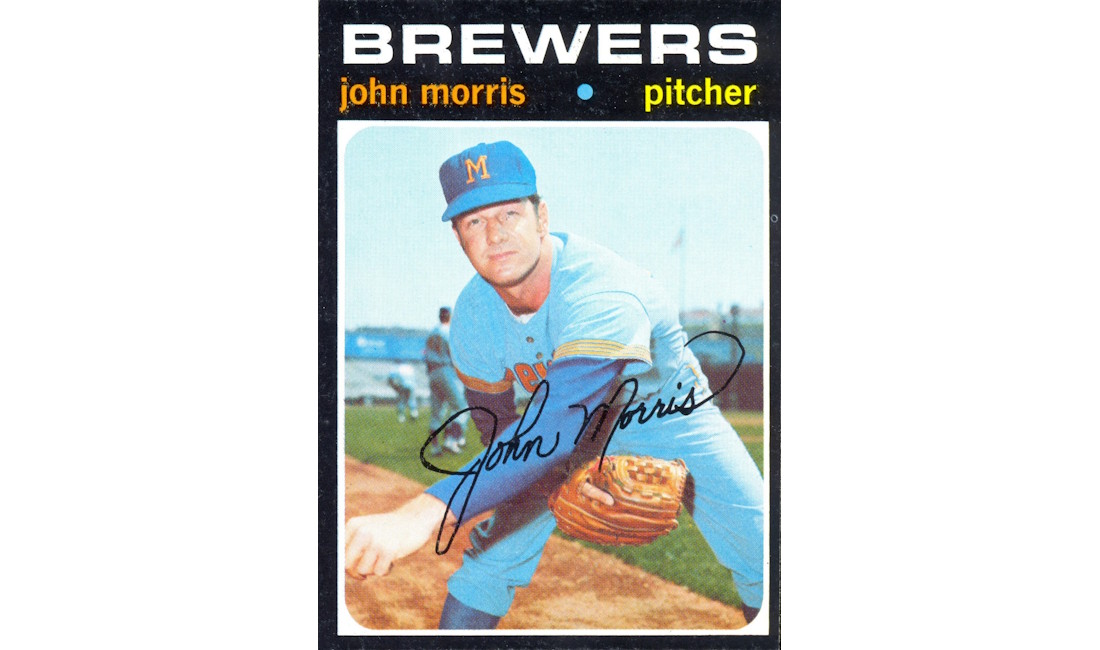RIP to John Morris, who was, for 6 games, a member of the Seattle Pilots as part of an 8-year major-league pitching career. Morris died on October 15 in Scottsdale, AZ, at the age of 84. Morris played for the Philadelphia Phillies (1966), Baltimore Orioles (1968), Seattle Pilots/Milwaukee Brewers (1969-71) and San Francisco Giants (1972-74).
John Wallace Morris was born in Lewes, DE, on August 23, 1941. He was, until Mason Fluharty debuted this season, the only major-league ballplayer to come from Lewes. He was a three-sport athlete at Lewes High School and ran for enough touchdowns to be named to the 1959 All-State scholastic football team as a senior. He was also a second-team basketball player, along with another future big leaguer, Coston Shockley of Georgetown High. Morris lettered in all three sports in all four years of his time in high school, and he was the captain of both the football and basketball teams. He was heavily recruited by colleges to play basketball and football, but the Philadelphia Phillies and scout John Ogden signed him in June 1960 for a $25,000 bonus. Later that summer, he debuted with the Johnson City Phillies of the Appalachian League. In 11 games, 5 of which were starts, Morris had a 5.56 ERA and won his only decision. He struck out 34 batters and walked 31 in 34 innings. He won 10 games for Elmira of the New York-Penn League in 1961 with a 2.02 ERA in 129 innings and then added 11 wins for the Magic Valley Cowboys in ’62. He missed the 1963 season, most likely due to military service.
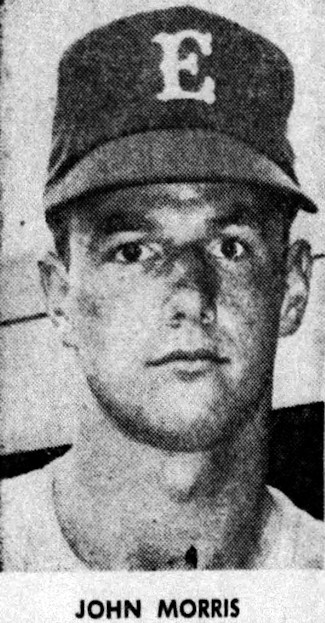 Source: Elmire Advertiser, August 30, 1961.
Source: Elmire Advertiser, August 30, 1961.
Morris struggled somewhat when he returned to the Phillies in 1964. He split time with Arkansas and Chattanooga in ’64 and ’65, turning in a 6-12 record and 2.30 ERA in 1965. Much of that was due to some questionable defense behind him, as 22 of the 58 runs he allowed were unearned. Morris, now 24, started the 1966 season with the San Diego Padres of the Pacific Coast League. Unlike past seasons, he was used exclusively as a reliever and posted a 2.70 ERA in 29 games. The Phillies decided to bring him up to the majors in July. According to the Philadelphia Daily News, Morris came from San Diego “with a reputation for not having what you would call a great assortment of stuff. But the other part of the reputation was that he knew how to get hitters out.” That’s what he did, when he was able to pitch. Morris made his debut on July 19 with a scoreless 2/3 of an inning against the Houston Astros. Then he threw 1-2/3 scoreless innings against San Francisco on July 24, catching Jim Ray Hart looking for his first major-league strikeout. Morris didn’t allow a run against Los Angeles on July 25 or St. Louis on August 11, giving him 3-2/3 shutout innings in Phillies losses. Morris was finally put into a pressure situation on August 19. The Phillies and Mets were tied at 4 in the top of the 10th inning, with the go-ahead run at second base and Ed Kranepool at bat. Oh, and there was a 3-2 count on Kranepool, because Philadelphia manager Gene Mauch yanked pitcher Joe Verbanic in the middle of the at-bat. “I told him to throw a John Morris curve,” Mauch later said. “What I meant was for him not to go in and try and pitch like Carl Hubbell or somebody. I was telling him that a John Morris curve was good enough to do the job.” Morris got Kranepool to foul out to third baseman Dick Allen, presumably on a John Morris curveball. Then he retired pinch-hitter Hawk Taylor and Ron Hunt to escape the inning. Allen belted a walkoff home run in the bottom of the inning to give Morris his first major-league win. “Phew, coming in with a 3-2 count… that’s the first time it ever happened to me,” said Morris. “I knew I had to throw him a strike.” Morris finally allowed a run in his seventh appearance, surrendering a home run to the Mets’ Jim Hickman. But he had a sub-2 ERA right up until he faced Houston on September 17. Mauch ran through 2 pitchers in the first inning alone and then brought Morris into the game. He threw a 1-2-3 second inning with 2 strikeouts, but the Astros sent 9 men to the plate in the third, scoring 6 runs on 4 hits. Norm Miller had the big blow with a 3-run homer. Morris allowed a total of 8 runs in 13-2/3 innings for the Phillies in 1966 for a 5.23 ERA. Take away that one awful performance, and the ERA drops to 1.54.
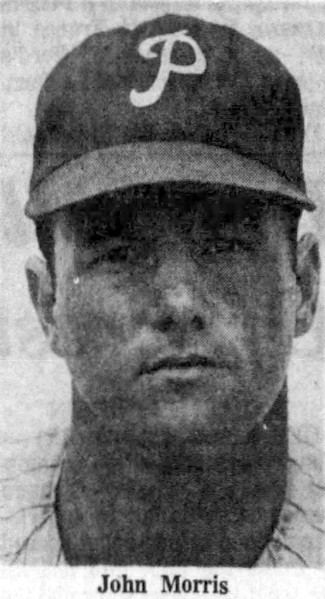 Source: The Daily Times, January 23, 1968.
Source: The Daily Times, January 23, 1968.
Morris returned to San Diego for the 1967 season and had a 3-0 record and 1.54 ERA in 33 relief appearances. All that brilliant season got him was traded to the Baltimore Orioles in December 1967. He was the player to be named later in a previous trade for Orioles reliever Dick Hall. Baltimore sent Morris to Rochester of the International League, and he won 3 decisions in 27 appearances in 1968. Then, Baltimore pitchers Dave Leonhard and Pete Richert were sent on two-week tours of duty with the National Guard, and Morris was one of the pitchers summoned to the majors to fill their spots. Morris picked up a win in his second outing but came into a game against the New York Yankees on August 2 with 4 runs allowed in 4 innings of work. Baltimore jumped out to an early lead, but starter Wally Bunker was pulled by manager Earl Weaver in the bottom of the third inning, with the Orioles leading 4-1 and runners on first and second. Morris came into the game and got Joe Pepitone to bounce into an inning-ending double play. He then retired the next 14 Yankees, not allowing a baserunner until Horace Clarke singled in the bottom of the eighth. Morris started the ninth inning by striking out Mickey Mantle and Pepitone, but then he gave up hits to Tom Tresh and Andy Kosco. Eddie Watt had to record the last out for Baltimore, but Morris’ brilliant relief outing earned him a win. What’s more, it probably saved his season and quite possibly his major-league career. Richert and Leonhard were due back from their National Guard stints, and Morris was due to be sent back to Rochester. “I’m not the one to say John saved his job or didn’t save it with that job he did tonight, but I’ll say he did a lot to earn one,” Weaver said. Days later, John O’Donoghue was the Orioles pitcher sent to the minors, and Morris stayed with the team for the rest of the season. He pitched in a total of 19 games, with a 2-0 record and a 2.56 ERA. He had 22 strikeouts and 17 walks in 31-2/3 innings. Other teams took notice of Morris’ work, most notably the expansion Seattle Pilots. The new club drafted Morris in the expansion draft, held after the season.
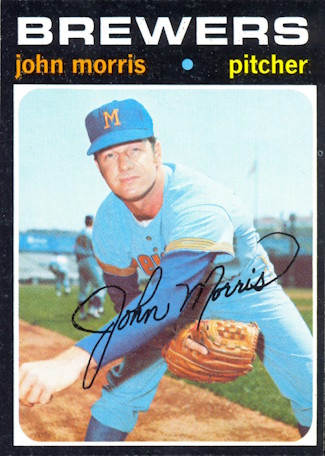
Morris began 1969 with Seattle and pitched in 6 games — all Pilots’ losses. He allowed 16 hits in 12-2/3 innings, with 8 strikeouts and 8 walks, and his ERA was a hefty 6.39 ERA. He was sent to Triple-A Vancouver, as the Pilots brought Jim Bouton to the majors. So Morris’ demotion, while bad for him, was a boon to the baseball literary world, because Ball Four probably would not have been published had Bouton spent the entire season in the minors. Morris worked as both a starter and reliever in the minors that season, and he had enough success that the team kept him on the big-league roster when it moved to its new home in Milwaukee. Morris pitched in the first-ever Brewers game, which was a 12-0 rout by the California Angels on April 7, 1970. He was the fifth and final Milwaukee pitcher of the day and allowed an unearned run in 2 innings. Morris had some good outings as a mop-up reliever and pitched 4-2/3 scoreless innings against the Yankees on May 2, after starter Marty Pattin allowed 4 runs and didn’t make it out of the first inning. After that outing, Morris was moved into the starting rotation. He took a no-decision in his first major-league start against Washington on May 9, throwing 7 innings of 2-run ball. Morris then had complete game victories in his next two starts, continuing his dominance over the Yankees on May 13 with a 3-1 win and then beating Oakland 6-3 on the 19th. Morris credited his success to winter ball. “Last winter I pitched down in Mexico. Everything that I have learned about pitching seemed to fall in place. It was like a jigsaw puzzle coming together,” he said. Morris missed about 3 months with a kidney ailment but made 20 appearances for the Brewers, including 9 starts. He had a 2-2 record and 3.72 ERA. He threw a career-best 73-1/3 innings and struck out 40 batters. A bone spur in his left elbow delayed Morris’ 1971 season until May, but he still pitched in 43 games for Milwaukee, with all but one coming as a reliever. The Brewers finished with 92 losses, so Morris most frequently worked as a mop-up man in losses, though he did pick up his first career save on July 11 by retiring Rich McKinney on a grounder to preserve a 1-0 win over the Chicago White Sox. On the year, Morris had a 2-2 record and the 1 save with a 3.72 ERA, and his 42 strikeouts were a career high.
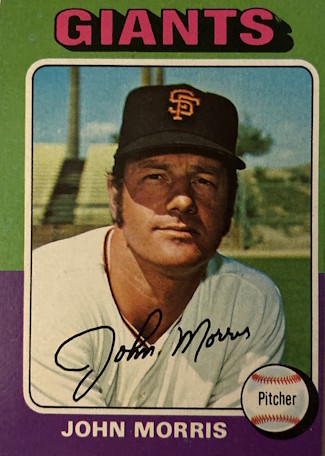
Milwaukee traded Morris to San Francisco on October 20 for minor-league pitchers Gary Ryerson and Leslie Scott. In his three years with the Giants, Morris spent most of his time playing in Triple-A Phoenix, with brief stints in the majors. He began 1972 with the team and made 7 relief appearances before being sent to Phoenix in May. He had no record with the Giants and a 4.26 ERA. In 1973, fresh off surgery to remove that troublesome bone spur, he again pitched in 7 games at the big-league level, with an 8.53 ERA. He picked up a win against the Atlanta Braves on July 2 despite allowing two of his three inherited runners to score on a Dusty Baker go-ahead single in the eighth inning. Chris Speier belted a 2-run homer off Joe Hoerner in the bottom half of the inning to give Morris the win. Morris didn’t join the Giants in 1974 until August, but he made 17 relief appearances with the club to close out the season. His second and last career save on August 31 against St. Louis came when he was one day away from completing 4 major-league seasons, making him eligible to be enrolled in baseball’s pension plan. “I don’t think I’ll answer my phone tonight,” he joked, but he didn’t have to worry. Manager Wes Westrum was impressed by his sinker, especially against left-handed batters. “Morris has earned a crack at making our club next spring,” Westrum said. Morris had a 1-1 record and a 3.05 for the Giants that year, with 9 strikeouts and 4 walks in 20-2/3 innings. He joined the Giants in spring training 1975 but failed to make the team. He was released at the end of March, bringing his pro playing career to a close.
Morris spent parts of 8 seasons in the majors and pitched in 132 games, making 10 starts. He had an 11-7 record with 2 saves and a 3.95 ERA. In 232-1/3 innings pitched, he struck out 137 batters and walked 86, and he had an ERA+ of 91 and a WHIP of 1.347. He also had a 57-47 record in 12 minor-league seasons, with 10 career shutouts and 6 saves. His winning record in the majors is remarkable when you consider that he typically was summoned to pitch in a losing situation. In the 132 games in which he appeared, his teams won 26 times and lost 106 — a sub-.200 winning percentage that amounts to about 130 losses in a 162-game schedule.
After he left baseball, Morris worked in the water purification business in Arizona until his retirement. He was inducted into the Delaware Sports Hall of Fame in 1987 and spoke to the Sunday News Journal about his memories in baseball. He faced Mickey Mantle 3 times in his career and retired him all three times, including that strikeout in the game that saved his career. “He swung at the first two, I think, and then took the third, a called strike. That’s a great feeling when you’re a kid,” he said. Morris is survived by his wife Judith and children Katrina, Elizabeth and Jad, as well as their families.
For more information: Cape Gazette
Follow me on Instagram: @rip_mlb
Follow me on Facebook: ripbaseball
Follow me on Bluesky: @ripmlb
Follow me on Threads: @rip_mlb
Discover more from RIP Baseball
Subscribe to get the latest posts sent to your email.

